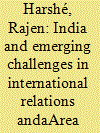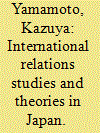|
|
|
Sort Order |
|
|
|
Items / Page
|
|
|
|
|
|
|
| Srl | Item |
| 1 |
ID:
170629


|
|
|
|
|
| Summary/Abstract |
This article captures a bird’s eye view of International Relations and Area Studies by offering a range of ideas and arguments from diverse phases including the current phase of globalisation. After exploring the nature of links between the two fields, it reflects on globalisation, looks at the prominent theories in international relations critically before moving on to discuss areas such as Latin America and Sub-Saharan Africa. Further, by shedding light on inter-area relations, it grapples to find a way to define an area. By treating India as an area in its own right, it relates India to different regions of Asia. It essentially argues that scholars in India need to evolve innovative concepts and theories by doing inter-disciplinary research that are useful for knowledge building exercises as well as policy think tanks.
|
|
|
|
|
|
|
|
|
|
|
|
|
|
|
|
| 2 |
ID:
103997


|
|
|
|
|
| Publication |
2011.
|
| Summary/Abstract |
A common view of Japan's International Relations (IR) studies in the post-World War II period is that they are characterized by pacifism and historical approaches. This paper argues that while pacifism has continued to serve as the basis of them, the approaches adopted by researchers have become increasingly diversified. Specifically, although the main issues for Japanese IR studies in the postwar period (i.e. defense strategy, world political economy, and global issues) have been consistently addressed by researchers on the basis of pacifism, the theoretical orientation of researchers has continually become stronger. Finally, this paper argues that both changing and continuous characteristics of IR studies in Japan have been supported by global developments, and concludes that this trend will continue into the near future.
|
|
|
|
|
|
|
|
|
|
|
|
|
|
|
|
| 3 |
ID:
103995


|
|
|
|
|
| Publication |
2011.
|
| Summary/Abstract |
This article investigates and explains the development of International Relations studies (IRS) in China, Japan, and India. Beginning in early 1980s IRS experienced exponential growth in China and is becoming a separate discipline in that country. Despite early starts, IRS in Japan and India is still an appendage in other disciplinary departments, programs, and centers although growing interest is discernible in both countries. Continued rise of Asian powers along with their growing roles and responsibilities in constructing and managing regional and global orders is likely sustain and increase interest in IRS in these countries and more generally in Asia. Distinctive trajectories have characterized the development of IRS in China, Japan, and India. Distinctiveness is evident in master narratives and intellectual predispositions that have shaped research and teaching of IR in all three countries. The distinct IRS trajectories are explained by the national and international context of these countries as well as the extensiveness of state domination of their public spheres. Alterations in national circumstances and objectives along with changes in the international position explain the master narratives that have focused the efforts of IR research communities. Extensiveness of state domination and government support, respectively, explain intellectual predispositions and institutional opportunities for the development of IRS. IRS in Asia has had a predominantly practical orientation with emphasis on understanding and interpreting the world to forge suitable national responses. That orientation contributed to a strong emphasis on normative-ethical dimensions, as well as empirically grounded historical, area, and policy studies. For a number of reasons including intellectual predispositions and constraints, knowledge production in the positivist tradition has not been a priority. However, IR theorizing defined broadly is beginning to attract greater attention among Asian IR scholars. Initial interest in Western IR theory was largely a function of exposure of Asian scholars to Western (primarily American) scholarship that has been in the forefront in the development of IR concepts, theories, and paradigms. Emulation has traveled from copying to application and is now generating interest in developing indigenous ideas and perspectives based on national histories, experiences, and traditions. Although positivism may gain ground it is not deeply embedded in the intellectual traditions of Asian countries. Furthermore, theorizing in the positivist tradition has not made significant progress in the West where it is also encountering sharp criticism and alternative theories. Asian IR scholarship would continue to emphasize normative-ethical concerns. And historical, area, and policy studies would continue to be important in their own right, not simply as evidentiary basis for development of law-like propositions. It also appears likely that Asian IR scholarship would increasingly focus on recovery of indigenous ideas and traditions and their adaptation to contemporary circumstances. The net effect of these trends would be to diversify and enrich existing concepts, theories, methods, and perspectives, and possibly provide fresh ones as well. The flourishing of IRS in Asia would make the IR discipline more international.
|
|
|
|
|
|
|
|
|
|
|
|
|
|
|
|
|
|
|
|
|